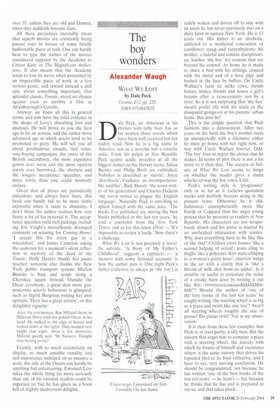The boy wonders
Alexander Waugh
WHAT WE LOST by Dale Peck Granta, £12, pp. 229, ISBN 071484392X Dale Peck, an American in his thirties with tufty hair, has so far written three novels which have been well received but not widely read. Now he is a big name in America, not as a novelist but a vitriolic critic. From his pulpit in New Republic Peck squirts acidic invective at all the biggest names on the literary scene. Julian Barnes and Philip Roth are rubbished, Nabokov is described as 'sterile', Joyce 'diarrhoeic', Faulkner 'an incomprehensible rambler', Rick Moody 'the worst writer of his generation' and Charles Dickens 'the worst writer to plague the English language'. Naturally Peck is unwilling to splash himself with the same juice. 'The books I've published are among the best books published in the last ten years,' he told a journalist from the New York Times; and as for this latest effort — 'It's impossible to review it badly.' Now there's a challenge.
What We Lost is not precisely a novel. Its subtitle, 'A Story of My Father's Childhood', suggests a capriccio — 'a memoir with some fictional accounts' is how the author puts it. One night Peck's father (referred to always as the boy') is
rudely woken and driven off to stay with an uncle he has never previously met on a dairy farm in upstate New York. He is 13 years old. His father is an alcoholic, addicted to a medicinal concoction of cornflower syrup and turpenhydrate; his mother, a hateful and volatile disciplinarian, loathes 'the boy' for reasons that are beyond his control. At home he is made to share a bed with his siblings, clouted with the metal end of a hose pipe and bashed in the face by bullies. On Uncle Wallace's farm he milks cows, mends fences, makes friends and kisses a girl's breasts after a cross-country run by a river. So it is not surprising that 'the boy' should prefer life with his uncle to the dissipated goings-on at his parentsurban home. But does he?
This is the simple question that Peck fashions into a denouement. After two years on the farm the boy's mother turns up unexpectedly with a dilemma: either he must go home with her right now, or stay with Uncle Wallace forever. Odd. The boy' lives to regret the choice that he makes. In terms of plot there is not a lot more to it than that. The success or failure of What We Lost seems to hinge on whether the reader gives a damn whichever way the boy votes. I did.
Peck's writing style is 'progressive' only in so far as it eschews quotation marks and dutifully beavers along in the present tense. Otherwise he is oldfashioned, atmospherically more like Hardy or Coppard than the angry young poseur that he presents to readers of New Republic. His characters are not scrupulously drawn and his prose is marred by an unchecked infatuation with similes. Why does everything have to be like this or like that? Children enter houses 'like a second helping of cereal'; jeans cling to thighs 'like a polyester skirt static-clinging to a woman's panty-hose'; emotion hangs in the air with a clarity that is 'like a thread of milk shot from an udder'. Is it sensible or useful to articulate the noise of a creaky barn door by writing it out like this: `rurrreeeeeeaaaaaakkkkkkhhhhhh!'? Should the author of 'one of the best books of the last ten years' be caught writing 'the steering wheel is as big as a pizza and twirls like one too'? Aren't all steering wheels roughly the size of pizzas? Do pizzas twirl? Not in my observation.
It is clear from these few examples that Peck is, at least partly, a silly man. But the naivety that urges him to compare a pizza with a steering wheel, the naivety with which he boasts of himself and excoriates others is the same naivety that drives his lopsided plot to its final reflective, and I have to say, very moving conclusion. He should be congratulated, not because he has written 'one of the best books of the last ten years' — he hasn't — but because he thinks that he has and is prepared to say so, and that takes pluck.


























































 Previous page
Previous page